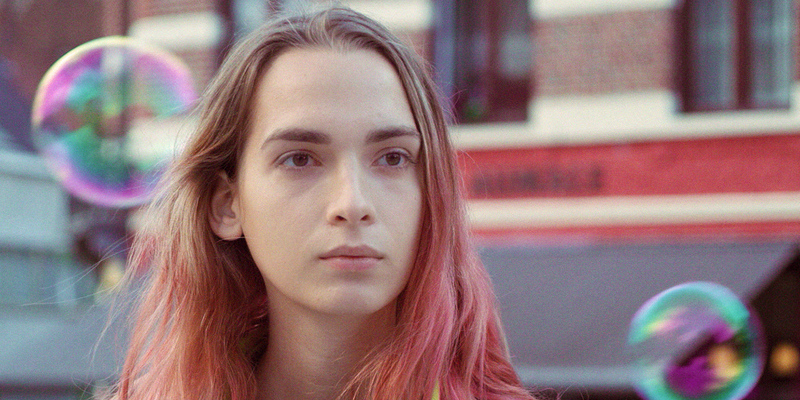
An estranged father and daughter embark on a road trip to honour the
wishes of their late wife/mother.
Review by
Benjamin Poole
Directed by: Laurent Micheli
Starring: Mya Bollaers, Benoît Magimel, Sami Outalbali

Melodrama and social realism bump heads in Lola and the Sea, the sophomore effort of Belgian born filmmaker Laurent Micheli.
Micheli’s debut, Even Lovers Get the Blues, was an LGBTQ+ themed paean to polyamory, anchored by its bisexual male
characters discovering the pleasures of passive sodomy along with the
brilliance of female breasts; its ribald art aspiring towards the
introspective eroticism of an Egon Schiele illustration (a character even
collects prints of the artist).

In Lola and the Sea, Micheli offers less adult-orientated content but a more mature
discourse on gender and sexuality. The titular Lola is a male to female
trans girl. Living in foster care, she is estranged from her family - her
dad, who is aggressively nonplussed by Lola’s biological destiny, has all
but disowned her, while her mum (who, we will find out, is more empathetic
to Lola’s situation) is in the final stages of a terminal illness.
Following a sun kissed opening of Lola skating at the park (her board,
which is from then on either strapped to her back or rolling along tarmac,
becomes a symbolic code of Lola’s transience; an all-purpose escape
route), we pick up with Lola as she learns that her mother has died.
Tragedy stimulates the narrative trigger, wherein, post the funeral and
scenes of familial conflict, Lola and her dickhead dad end up fulfilling
her mum’s wishes to deposit her ashes on a beach at the North Sea. Will
they sort out their differences and learn to accept each other’s point of
view? You’ll have to watch Lola and the Sea to find out!

Essential road movie structures aside, this is really a character driven
narrative and as such is Lola’s film. Played by startlingly watchable
actor Mya Bollaers (I use the noun in the same denotative way as I
would the word poet, as Bollaers is a trans woman), it is Lola’s simmering
angst and burgeoning self-assurance which gives
Lola and the Sea its gravity. Following a career mainly
spent before the camera, Micheli’s direction alchemises with Bollaer’s
performance to create vivid characterisation: I loved Lola’s lack of
self-pity, her anger and her impetuosity. Despite the bravado, Lola is, of
course, intensely vulnerable. She is a kid - and one who is negotiating
seismic physical change with limited support, within a society which
already ostracises her. Her immaturity manifests in bubbles of rage such
as her smashing the frontage of her old man’s store, and, in an inspired
gag, throwing pink paint over his windscreen - the dried remnants of which
stay there for the remainder of the film and the entire road journey!
Having the fortune to be born into a body I love and a sexuality I am
entirely comfortable with, films like Lola and the Sea serve
as a welcome privilege check to me and my smug ilk (which is to say that
in my happy-go-lucky bubble, it’s easy to say live and let live with Trans
issues, which in its own way is a form of ignorance: a breezily optimistic
discount of the troubled reality faced by the trans community. And while
we’re on the digression, what is the actual problem certain individuals
have with Trans people? That ‘men’ will be hanging out in ‘female’
toilets? Hahahaha - come on; there has to be an easier way for potential
wrong ‘uns to do this than gender reassignment. That ‘men’ will be
competing in ‘female’ sports? Grow up! It’s running and throwing a ball
around: who cares?).

That said, I could have done with more narrative focus on the dad:
although his hostile bigotry does thaw somewhat in the third act, perhaps
a more sympathetic portrayal would have supported
Lola and the Sea’s themes (transphobia is a sickness: a fear which requires remedy and
compassion). Instead, the rhetoric is filtered occasionally through stock
characters, such as the brassy owner of an inn the duo rock up in, and a
couple of fédérale pigs who give Lola grief, with the presence of such
archetypes giving the film an incongruous whimsy. Nonetheless this is a
solid drama, with a superb central performance. With reports that
Transphobic hate crimes are on the rise, Lola and the Sea is a film made vital by its social
context. I look forward to a future where its ideologies seem quaint and
passé, and not, as they are, urgently relevant.

Lola and the Sea is in UK cinemas
and on VOD from December 17th and in Irish cinemas from December 27th.

